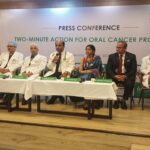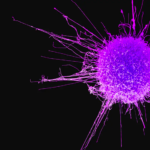India
healthysoch
New Delhi, November 04, 2024:
 Apollo Cancer Centers, Visakhapatnam; introduced CAR-T cell therapy for the first time in the state of Andhra Pradesh. CAR – T cell therapy is a revolutionary treatment approach for difficult to treat blood cancers where conventionally available treatments have failed.
Apollo Cancer Centers, Visakhapatnam; introduced CAR-T cell therapy for the first time in the state of Andhra Pradesh. CAR – T cell therapy is a revolutionary treatment approach for difficult to treat blood cancers where conventionally available treatments have failed.
CAR-T cell therapies are biological drugs. They involve extracting immune cells called T-lymphocytes, from patient’s body then re-programming these T-cells to engage specific targets on the surfaces of certain cancer cells. The re-programming is performed with the help of a safe vehicle called a viral vector, which are genetically modified to confer certain fixed properties to the cells. Chimeric Antigen Receptor (CARs) are then expressed on the surfaces of T-cells. These cells are grown in a laboratory setting to a desirable dose, and are then injected back to the patient, so that they identify the target Cancer cells and eventually destroy them.
Globally approved CAR-T cell therapies target either the CD19 antigen, present in certain B-cell Non-Hodgkin’s Lymphomas (B-NHLs) and B-cell Lymphoblastic Leukaemias or BCMA present in Multiple Myeloma. Six such CD19-directed or BCMA-targeting CAR-T cell therapies are approved in several Western Countries. Some are approved regionally in countries such as China and Israel. Beyond these blood cancers, several CAR-Ts and other genetically modified cell therapies are being developed to treat solid and connective tissue cancers.
In India, the first commercially approved CAR-T cell therapy is NexCAR19™. It targets CD19 and is approved for treatment of patients aged 15 years and above with B-cell Non-Hodgkin’s Lymphomas & B-cell Acute Lymphoblastic Leukaemia (B-ALL). It was developed by IIT-Bombay and its spin-off company ImmunoACT and was clinically steered by Tata Memorial Centre. Another CAR-T cell therapy developed by IDIBAPS in Barcelona in partnership with Immuneel Therapeutics in Bengaluru has also been recently approved for B-NHLs.
Generally, in B-cell cancers, a remission that persists for 5 years or more is considered a functional cure. Results may depend on a number of factors including the burden and nature of the disease, when and which prior treatments were administered, and whether CAR-T cell therapy was administered earlier or later in the line of treatment. Overall, results vary with every CAR-T cell therapy but the chances of survival without progression of the disease are generally higher than 40% over 3 years based on available data from globally approved CAR-T cell therapies. With Indian CAR-T cell therapies the data is still young and will mature in time
Treatment with CAR-T involves 3 major steps:
- Leukapheresis: This is the process of collection of white blood cells, which is performed at the treatment centre/hospital. Leukapheresis is a day-care procedure, and usually requires 2-3 hours.
- Interim period: CAR-T cells are is usually manufactured within 3 weeks of the shipment of the Leukapheresis sample. In the Interim period, oncologist may administer a Bridging Therapy to lower patient’s disease burden. Approximately 5 days before CAR-T cell infusion, patient will start receiving a Conditioning Chemotherapy so that his/her body is ready for CAR-T cell infusion.
- Infusion: CAR-T cells are infused as an in-patient procedure. Patient may be hospitalized for ~7-15 days to monitor and manage side effects, based on the physician’s discretion. Patient may experience fever, muscle ache, dizziness, breathing difficulty, and tiredness within the first 2-3 weeks from Infusion and may receive medications if required, to manage these symptoms.
CAR-T cell therapy is available in Apollo Cancer Centers, Visakhapatnam in the state of Andhra Pradesh. As one of the earliest adopters of this treatment across India, in partnership with Immuno Act, Apollo Cancer Centers, Vizag was able to bring cutting edge cellular therapy to the State of Andhra Pradesh. With this pioneering effort patients with hitherto dismal scenario got a fresh lease of life.
CAR-T cell therapy involves some known side-effects called Cytokine Release Syndrome (CRS), Macrophage Activation Syndrome (MAS/HLH), and Immune-cell Effector-Associated Neurotoxicity (ICANS), in which the patient may experience symptoms such as Fever, nausea, tiredness, chills, confusion, in rare cases severe infection and seizures. These are usually resolved within 7-15 days of hospitalization post-infusion.
healthysoch







